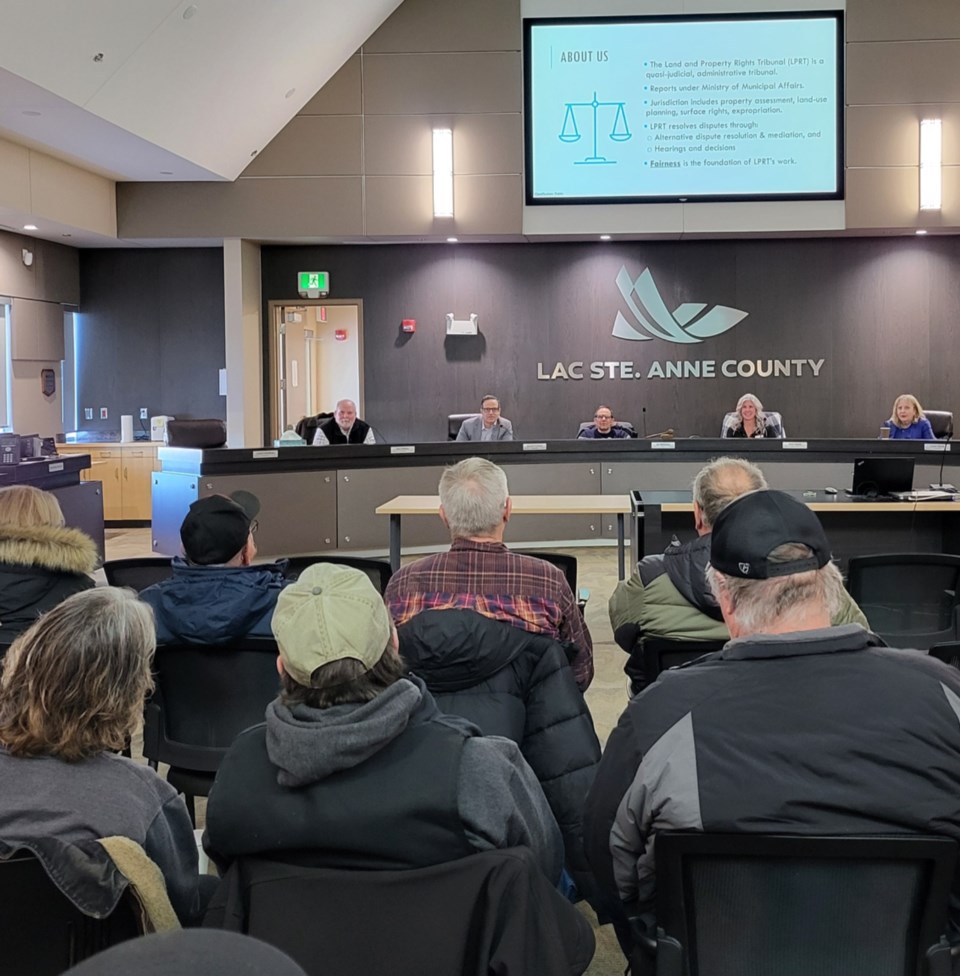Four organizations that Alberta has in place assists with orphan wells situations, problems and inquiries and they came together to present an information session on Feb. 5.
Lac Ste. Anne County hosted the Orphan Well Association, The Farmer’s Advocate, The Land and Property Rights Tribunal and Alberta Energy Regulator representatives to meet with landowners and interested parties.
“The oil and gas industry is the only industry that takes care of their bankrupt companies,” said Lars De Pauw, the Orphan Well Association's president.
Alberta taxpayers do not pay for the clean-up or reclamation of orphan wells, the oil and gas industry does, said De Pauw.
This funding does not apply to outstanding municipal taxes. Other provinces do not have this advantage for landowners.
The Orphan Well Association does inspections of every decommissioned orphan well, according to De Pauw.
They have an interactive map on their website that shows the status of each orphan well they have been referred for anyone interested in what is happening in the province.
The Orphan Well Organization has been assigned the priority of handling the reclamations of 2,500 Sequoia wells as of Jan. 29.
Darcy Allen, Energy, utility and policy specialist with the Farmers’ Advocate Office, said they provide objective, unbiased information on situations including orphan wells, contracts, grazing situations, grain delivery challenges, and fence line disputes.
They can provide letter templates for landowner issues where it is not known how to address a situation.
They understand the Surface Rights Act and help landowners learn about the details in reference to their own questions.
Renewable energy sites like wind and solar are not applicable to the Surface Rights Act and can be very complex according to Allen.
The key takeaways were for landowners to keep detailed records – take pictures, keep logbooks of interactions and activities recording the who, what, where, when and why – track time spent and receipts for supplies used for things like weed control.
If a landowner has not put together all their well lease information and contracts it was recommended to do it now.
In a situation where rent for a well site is not paid, the Farmers’ Advocate Office can provide guidance.
It is the Land & Property Rights Tribunal that will assess a landowner’s case where rent payments are outstanding for compensation.
They are an independent group that resolves disputes on assessments said Mike Hartfield, the Tribunal's executive director of operations.
Those assessments can involve development disputes, sold farms, gravel pits, compensation disputes and Surface Rights Act disputes.
The volumes of cases have risen substantially for the Land & Property Rights Tribunal from a few hundred in 2015 to 6,500 in 2024.
A new phone system has been implemented in January to address calls not being answered when calling the Tribunal offices.
A question was asked regarding how long to wait if rent on a well site is not paid.
The Tribunal representatives said don’t wait. Fill out the forms, online submissions are most efficient, and start the process with the Tribunal.
The repayment order timeline has been decreasing and in simple cases is now down to three to six months from two years.
The Tribunal's message was that landowners have rights to be compensated, the rights to apply. The Tribunal will do the research and find the answers and work with landowners to apply for compensation.
Leanne Chartrand, engagement specialist for the Alberta Energy Regulator, said they are responsible for ‘out of ground to refinery’ jurisdiction to develop and enforce rules as per established policies.
They do regular inspections of well pads and pipelines and penalize when infractions are found.
Alberta Energy Regulator has no jurisdiction over renewable energy sources such as wind and solar.
They have an interactive map on their website where you can see tax dollars in arrears.
The Closure Nomination Program enables landowners to nominate the closure of a site not producing for a minimum of five years for reclamations.
Interested people can order a Land Development Information Package for a fee that provides information on including wells, facilities, incidents, and licensee details.



